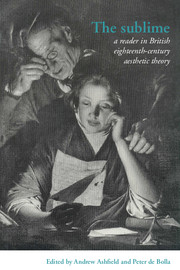Book contents
- Frontmatter
- Contents
- List of Abbreviations
- Introduction
- Part I The Longinian tradition
- 1 Dionysius Longinus on the sublime (1743)
- 2 Remarks on a book entitled, Prince Arthur (1696)
- 3 The advancement and reformation of modern poetry (1701)
- 4 The grounds of criticism in poetry (1704)
- 5 Essays upon several subjects (1716)
- 6 A miscellany of ingenious thoughts (1721)
- 7 An essay on the theory of painting (1725)
- 8 Reflections on the nature and property of languages (London 1731)
- 9 The works (1735)
- 10 Lectures on poetry (1742)
- Part II Rhapsody to rhetoric
- Part III Irish Perspectives
- Part IV The Aberdonian Enlightenment
- Part V Edinburgh and Glasgow
- Part VI From the Picturesque to the Political
- Sources and further reading
4 - The grounds of criticism in poetry (1704)
Published online by Cambridge University Press: 05 June 2012
- Frontmatter
- Contents
- List of Abbreviations
- Introduction
- Part I The Longinian tradition
- 1 Dionysius Longinus on the sublime (1743)
- 2 Remarks on a book entitled, Prince Arthur (1696)
- 3 The advancement and reformation of modern poetry (1701)
- 4 The grounds of criticism in poetry (1704)
- 5 Essays upon several subjects (1716)
- 6 A miscellany of ingenious thoughts (1721)
- 7 An essay on the theory of painting (1725)
- 8 Reflections on the nature and property of languages (London 1731)
- 9 The works (1735)
- 10 Lectures on poetry (1742)
- Part II Rhapsody to rhetoric
- Part III Irish Perspectives
- Part IV The Aberdonian Enlightenment
- Part V Edinburgh and Glasgow
- Part VI From the Picturesque to the Political
- Sources and further reading
Summary
Chapter IV
What the greater Poetry is, what Enthusiasm is.
The greater poetry then, is an art by which a poet justly and reasonably excites great passion, in order to please and instruct, and make mankind better and happier; so that the first and grand rule in the greater poetry is, that a poet must every where excite great passion: but in some branches of the greater poetry, it is impossible for a poet every where to excite in a very great degree, that which we vulgarly call passion: as in the ode, for example, and in the narration of the epic poem. It follows then, that there must be two sorts of passion: first, that which we call vulgar passion; and secondly, enthusiasm.
First, vulgar passion, or that which we commonly call passion, is that which is moved by the objects themselves, or by the ideas in the ordinary course of life; I mean, that common society which we find in the world. As for example, anger is moved by an affront that is offered us in our presence, or by the relation of one; pity by the sight of a mournful object, or the relation of one; admiration or wonder, (the common passion, I mean; for there is an enthusiastic admiration, as we shall find anon) by the sight of a strange object, or the relation of one.
- Type
- Chapter
- Information
- The SublimeA Reader in British Eighteenth-Century Aesthetic Theory, pp. 35 - 39Publisher: Cambridge University PressPrint publication year: 1996
- 1
- Cited by

